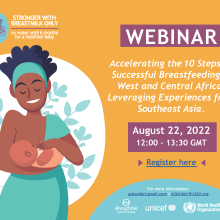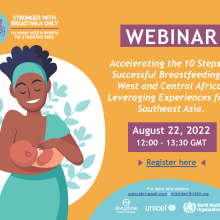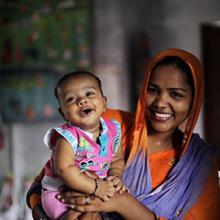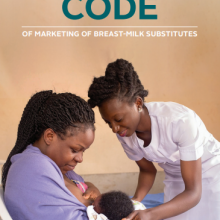Presentation, Video
Aug 26 2022

Accelerating the 10 Steps to Successful Breastfeeding in West and Central Africa: Leveraging Experiences from Southeast Asia
In August 2022, UNICEF, WHO, Irish Aid and Alive & Thrive's offices in West Africa and Southeast Asia collabor
Announcement
Aug 01 2022

WEBINAR: Accelerating the 10 Steps to Successful Breastfeeding in West and Central Africa. Leveraging Experiences from Southeast Asia
The Stronger with Breastmilk Only regional initiative, a collaboration of UNICEF, WHO and Alive & Thrive, is pleased to invite stakeholders to a 90-minute webinar on August 22 at 12:00 GMT to discuss how to accelera
Announcement
May 31 2022

South Asia Newsletter
Subscribe to and read our monthly South Asia Newsletter to stay up to date on all of Alive & Thrive's activities across the South Asia region.
Guide/Manual
Feb 09 2022

A Quick Guide: The International Code of Marketing for Breast-milk Substitutes
Updated February 2022!
This quick guide summarizes the International Code of Marketing of Breast-milk Substitutes (The Code) and relevant resolutions of the World Health Assembly that help protect breastfeeding around the globe.
Journal article
Dec 08 2020

Can complex programs be sustained? A mixed methods sustainability evaluation of a national infant and young child feeding program in Bangladesh and Vietnam (Moucheraud, C., 2020. BMC Public Health)
This study evaluates the sustainability of activities introduced during A&T implementation (2009–2014) in Bangladesh and Vietnam, revealing that multiple activities, such as mass media campaigns, policy and advocacy activities, and social mobilization activities were integral to the program’s
Journal article
Jan 11 2019

Nutrition interventions integrated into an existing maternal, neonatal, and child health program reduced food insecurity among recently delivered and pregnant women in Bangladesh (Frongillo E., 2019. Journal of Nutrition)
This study investigated whether participation in nutrition-focused antenatal care can be a way to reduce food insecurity during pregnancy and the postpartum period.

